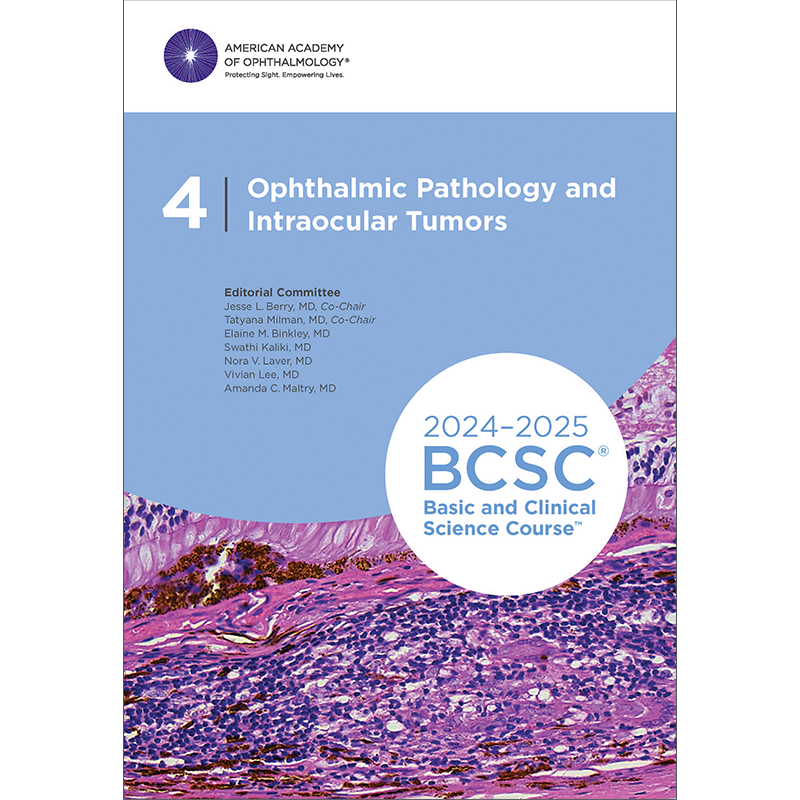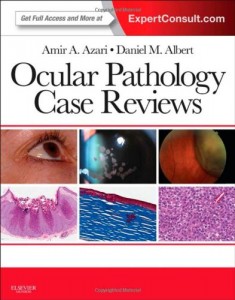No products in the cart.
Ophthalmology Books, Ophthalmic Pathology and Intraocular Tumors
2024-2025 Basic and Clinical Science Course, Section 04: Ophthalmic Pathology and Intraocular Tumors – Major revision (Original PDF)
Format :Published PDF
File Size :615.2 MB
$8.00
Major Revision
Section 4 the Academy’s Basic and Clinical Science Course™ (BCSC®) presents materials in 2 parts: Part I, Ophthalmic Pathology; and Part II, Intraocular Tumors. The hierarchy of the chapters in Part I moves from general to specific to help clinicians derive a differential diagnosis for a specific issue. Part II is a compilation of selected clinical aspects of importance to the general ophthalmologist – this section contains extensive discussion of intraocular tumors.
BCSC Section 4 also links selected content to the online Pathology Atlas, which contains supplemental images and case studies to help enhance reader understanding. Symbols throughout the book indicate where readers can find supplemental content in the Atlas. Additionally, Section 4 now contains Clinical Pearls, which identify information with direct relevance to clinical practice.
Chapter Two has been reformatted into a Quick-Start Guide that outlines pathology in an easy-to-follow format, provides a glossary of select pathology terminology, and contains new features, such as Key Points icons and Take Note boxes, which identify important information.
Section 4 of the BCSC includes 10 activities and 11 videos (sample). Additional educational activities, including self-assessment modules and videos, facilitate learning key concepts in ophthalmic pathology. An online Pathology Atlas provides additional images, case studies, and other resources. Both print and eBook users have access to the videos and activities.
Upon completion of Section 4, readers should be able to:
- Describe a structured approach to understanding major ocular conditions based on hierarchical framework of topography, disease process, and differential diagnosis
- List the steps for handling ocular specimens for pathologic study, including preoperative surgeon-pathologist communication and obtaining, appropriately submitting, dissecting, processing, and staining tissues
- Explain the basic principles of special procedures and diagnostic testing used in ophthalmic pathology, such as immunohistochemistry, flow cytometry, and molecular genetic techniques
Section Co-Chairs: Jesse L. Berry, MD, Tatyana Milman, MD
Print: 444 pages
EBook: Read Academy eBooks online from nearly any computer, or download eBooks to your mobile device with the free Academy eBooks app. For eBook features, requirements and licensing, visit: aao.org/ebooks. Please allow up to 90 minutes for receiving an access key (via email) that will allow you to retrieve your eBook after purchase.
Print ISBN: 978-1-68104-786-7
EBook ISBN: 978-1-68104-812-3
Print & EBook ISBN: 978-1-68104-799-7
About The BCSC
The Academy’s Basic and Clinical Science Course™ is ophthalmology’s definitive source of clinical information. Practicing ophthalmologists and residents worldwide use the BCSC® to ensure the highest-quality patient care.
Each of the 13 volumes includes up-to-date clinical knowledge, concise text, tables, photos and illustrations, multimedia, self-assessment questions with answers, and opportunities for earning AMA PRA Category 1 Credit™.
Beginning with the 2013–2014 edition, the Academy and the European Board of Ophthalmology (EBO) have partnered to make the BCSC the standard text for all European ophthalmology training programs. The EBO now recommends the BCSC as the primary educational resource for European trainees and ophthalmologists studying for the annual EBO Diploma Exam.
CME Information
The American Academy of Ophthalmology is accredited by the Accreditation Council for Continuing Medical Education (ACCME) to provide continuing medical education for physicians.
The American Academy of Ophthalmology designates this enduring material for a maximum of 10 AMA PRA Category 1 Credits™. Physicians should claim only the credit commensurate with the extent of their participation in the activity.


![[Original PDF] Ocular Surface Disease: Cornea, Conjunctiva and Tear Film](https://ophthalmologyebooks.store/wp-content/uploads/2022/12/9781455756230.jpg)
![[Original PDF] AUDIOLOGY Diagnosis 2nd](https://ophthalmologyebooks.store/wp-content/uploads/2022/12/audiology-diagnosis-2nd-228x3001-1.jpg)

![[Original PDF] Synopsis of Clinical Ophthalmology: Expert Consult – Online and Print, 3th Edition](https://ophthalmologyebooks.store/wp-content/uploads/2022/12/9780702050374.jpg)